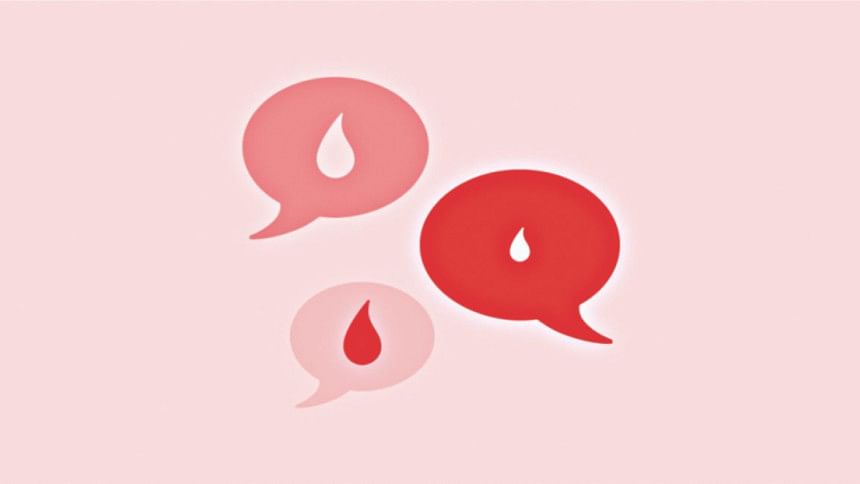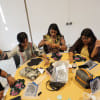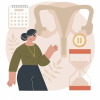Breaking the silence on menstruation

Today, May 28, is Menstrual Hygiene Day. The objective of observing this day is to raise awareness of the challenges women and girls face worldwide due to menstruation and highlight solutions addressing these challenges.
Choosing May 28 as Menstrual Hygiene Day has a symbolic meaning. May is the fifth month of the year and women menstruate on average five days every month, and their cycle tends to be around 28 days. The theme of this year's Menstrual Hygiene Day is "empowerment". The aim of the theme is to have a setting where women and girls can learn to take care of their body, health, mind and spirit during menstruation.
The theme is very relevant for Bangladesh. Though menstruation is a biological and essential part of women's and girls' reproductive cycle, in Bangladesh, menstrual management decisions are mostly based on people's cultural belief rather than proper information. It remains a taboo subject that is rarely discussed. Also, various stigma and myths surrounding menstruation hinder women's and girls' right to food, health, education, work, and dignity, and obstruct gender equality more broadly.
According to Unicef and WHO (2014), appropriate menstrual hygiene management (MHM) refers to women's and girls' access to clean menstrual management materials to absorb or collect blood that can be changed in privacy as often as necessary for the duration of the menstruation period; access to soap and water for washing the body as required; and having facilities to dispose of used menstrual management materials.
In 2014, the preliminary report of Bangladesh National Hygiene Baseline Survey indicated that knowledge on MHM among women and girls in Bangladesh is very limited. Less than 20 percent of women and girls practise hygienic menstrual management. Girls are mostly not introduced to menstruation before menarche (the first occurrence of menstruation) and 70 percent of girls get information from their mothers which is often not correct. Only 20 percent of girls get information from their teachers. Even though lessons on physical and psychological changes at adolescence are already in the school curriculum, in most of the schools this is not taught by the teachers. Teachers ask students to read those lessons on their own at home. Over 40 percent of girls do not attend school during menstruation for three days in a month on average because of a limited number of separate toilets for girls with adequate privacy, lack of access to toilet with WASH (water, sanitation and hygiene) and MHM facilities, and due to a feeling of sickness during menstruation which is directly linked with MHM.
In addition, only 10 percent of girls and 25 percent of adult women use sanitary napkins during menstruation, while others use old cloths, cotton or tissue. The major reasons behind women's and girls' limited use of sanitary napkins are: (i) they cannot afford to buy sanitary napkins; (ii) they feel shy to ask male members of their family to buy sanitary napkins for them; (iii) they feel shy to buy sanitary napkins in the market from male shopkeepers; (iv) access to market is limited; and (v) sanitary napkins are not available in some rural areas.
Furthermore, around 89 percent of women and girls dry and store the old cloth used to manage menstruation in a hidden place for repeated future use without proper laundering which is very unhealthy. A culture of shame forces them to keep these cloths out of sight of men and others. This practice makes them more likely to contract reproductive tract infections (RTIs). Very often serious infections are left untreated.
Ninety-five percent of girls experience restrictions in their daily lives during menstruation (restrictions on going outside of the home, especially in the evening, visiting religious places and social gatherings, attending religious and socio-cultural activities, sharing the bed with others, cooking in the kitchen, stepping on cow dung, touching clay pots, using oil in the hair, consuming nutritious food, especially meat and fish, taking baths, looking in the mirror, touching a cow or a plant, etc). In rural areas, it is believed that menstruation is a sign that a girl is suitable for marriage.
Therefore, unawareness, shame, and inconveniences linked to menstruation are some of the key obstacles for women's and girls' social, economic, political and physical empowerment. By remaining unaware of what happens in their bodies during menstruation and what course of action to take, women and girls face restrictions when it comes to work and education (leading to bad performance in these areas); endure malnutrition because of the lack of nutritious food; contract reproductive health diseases; face social violence like early marriage and illegal abortion; face restricted mobility; and are deprived of family and social support. All these factors combined decrease their opportunities and set them up for a lifetime of dis-empowerment.
Understanding these facts and overcoming them is crucial in ensuring women's and girls' empowerment. However, it is not possible to do so only by incorporating MHM issues in the school curriculum and having discussions on these issues in the classroom, or by improving WASH and MHM facilities everywhere, or with greater awareness of taboos and knowledge of proper methods to manage menstruation. It is also important to enable women and girls to get access to, afford and use improved menstrual management materials by creating earning opportunities for them; improving their access to the market; marketing alternative recyclable low-cost menstrual management materials; mainstreaming MHM in WASH, health, and gender-related programmes; monitoring of progress regularly; and most importantly creating an enabling environment involving all the people in the community. These factors are obviously not all that need to be taken into account to ensure good MHM practice. However, this is a good place to get the ball rolling.
While MHM issues have recently gained attention in the global development agenda, Bangladesh needs to focus on them seriously. Above all, the number of women and girls of reproductive age is huge, and access to MHM materials and facilities will make them more confident and will ease the barriers in the way of their potential and capabilities. Thus, by building strong partnerships across non-government and government bodies, we can help to eradicate the challenges surrounding MHM and open a window of opportunity for women and girls as well as create a solid foundation for their empowerment.
Khadiza Akter is a programme officer at Gender and Water Alliance-Bangladesh (GWA-B). Email: [email protected]










Comments